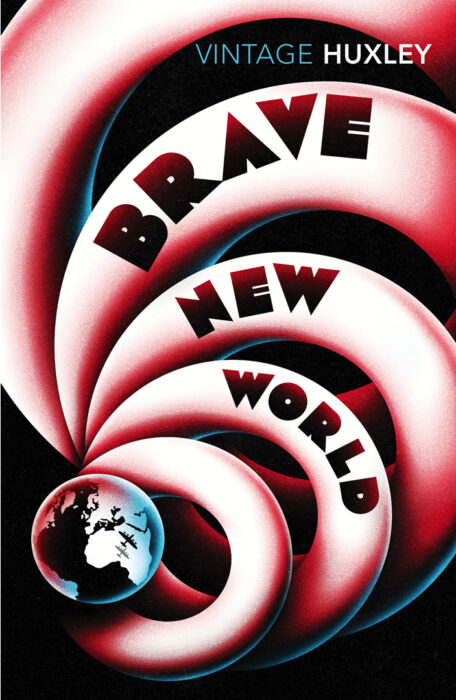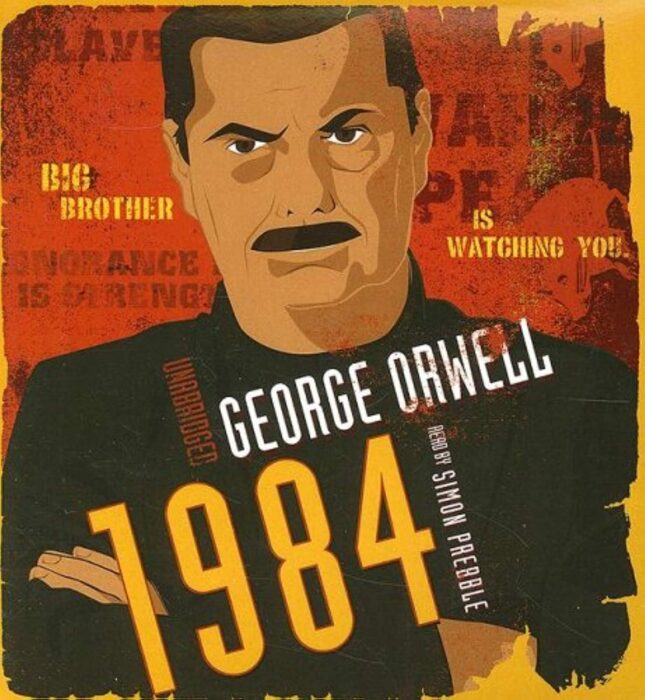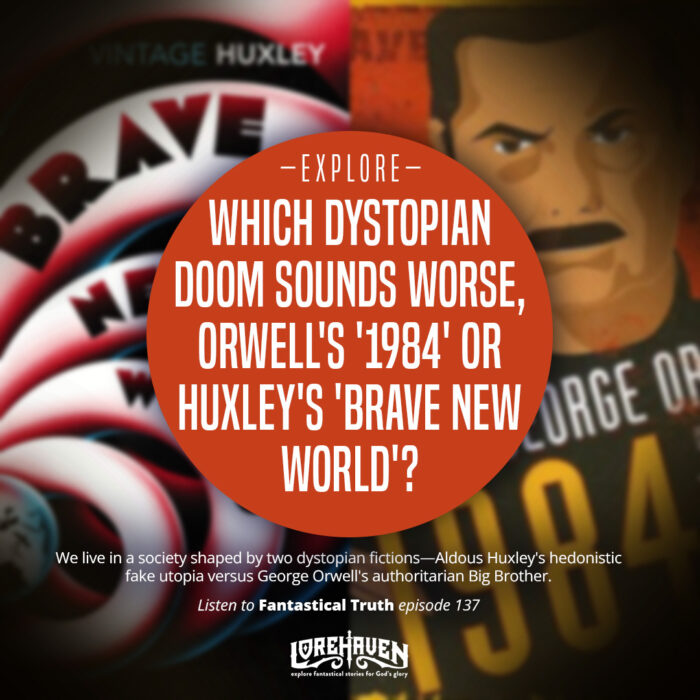137. Which Dystopian Doom Sounds Worse, Orwell’s ‘1984’ or Huxley’s ‘Brave New World’?
Podcast: Play in new window | Download (Duration: 1:34:59 — 88.3MB) | Embed
Just in time for Election Day, we’ve begun our new series: Dystopian Doom. That means we should start with the two most infamous dystopian novels ever made. You’ve heard of them and may have already read them—Aldous Huxley’s Brave New World (1932) and George Orwell’s Nineteen Eighty-Four (1949). What are their differences? Which villain is worse, the flippant Mustapha Mond or the torture of Big Brother? And, of course, which one of these dystopian dooms are we more likely to confront today?
Subscribe to Lorehaven
articles • news • library • reviews • podcast • gifts • guild
Episode sponsors
- Enclave Publishing: Aberration by Cathy McCrumb
- Mountain Brook Fire, Wraithwood by Alyssa Roat
- David Umstattd, The Pilgrim’s Progress Reloaded
Explore the complete Podcast Sponsors page.
Quotes and notes
- Leaked Documents Outline DHS’s Plans to Police Disinformation
- What is Elon Musk’s X, the ‘everything’ app? Here’s what you need to know
- Brave New World vs. 1984: Which dystopian future is scarier? Peacock stars agree
- Which Dystopian Novel Got It Right: Orwell’s ‘1984’ or Huxley’s ‘Brave New World’? (Published 2017)
- Fantastical Truth ep. 55. Should Christians Embrace Cultural and Digital Enclaves? | with Austin Gunderson
Concession stand
- If you’re listening in the U.S. on release date, “happy” Election Day!
- If you’re listening weeks afterward, we’re still counting votes. This is fine.
- Like any Dystopian Doom episode, we avoid specific parties/policies.
- But these issues of basic humanity are supra-political, beyond politics.
- They’re far more about how we recognize and organize moral realities.
- Please note that neither Huxley or Orwell was a professing Christian.
- Also, big discernment note: both these novels include sensual scenes.
- We’ll speak cautiously about these, and ask: which one wears it better?
- For that reason, Stephen doubts those scenes are appropriate for teens.
- Read in early adulthood, or if you struggle with some sins, avoid them.
 1. How does Brave New World ‘condition’ humans?
1. How does Brave New World ‘condition’ humans?
- This world has a little-known name; it’s referred to as the World State.
- Book opens with all worldbuilding: a human embryo/caste growth lab.
- We then move to labs where people are forcibly educated/conditioned.
- This is how people get sorted in society, but they all legitimately like it.
- If you don’t like it, you can always take the drug “soma,” or pop culture.
- Movies are “feelies.” Music, families, and even religion are all synthetic.
- Many chapters later we meet actual main characters, and many shocks.
- Our “heroes” are Bernard Marx and Lenina Crowne (name meanings?).
- Key phrases include “Community, identity, stability” (World State Motto).
- “Everyone belongs to everyone else” shows total sexual libertinism.
- “Spending is better than mending” calls for total consumerism.
- We’re shocked by how the World State hates life, religion, and families.
- Ultimately the novel ends tragically, with the one empathetic hero killed.
 2. How does 1984’s Big Brother torture humans?
2. How does 1984’s Big Brother torture humans?
- This world’s name is also more popular: the totalitarian Oceania.
- But the world is split into three huge states: Oceania versus two others.
- Orwell introduces his central hero, Winston Smith, almost immediately.
- Smith begins to discover his own “wrongthink” against Big Brother.
- He also falls in love with a morally dubious woman named Julia.
- All along, Winston helps introduce us to this clearly totalitarian state.
- You’ve heard the phrase “Oceania has always been at war with East Asia.”
- No doubt you’ve also heard “thought police,” “memory hole,” “ministry of truth.”
- People often reference “Newspeak,” “wrongthink,” “unpersons,” and other terms.
- On top of all the worldbuilding, it’s a genuine suspenseful spy thriller.
- We’re shocked by the novel’s prescience about big-tech surveillance.
- Also, Orwell names names: Big Brother’s philosophy is called “Ingsoc.”
- That’s short for “English socialism,” tying that personality cult to his present.
3. Which dystopia is morally worst or most realistic?
- 1984 reminds us of obvious government/big tech totalitarian control.
- Orwell’s evil is top-down, over top of basically decent people.
- Yet Huxley’s Brave New World is closer to our reality in Western culture.
- Our “conditioning” is less overt, often volunteered by popular culture.
- We find clever nonpartisan ways to blend consumerism and sex-worship.
- But we’re approaching the point of overt government power in culture.
- Some government leaders intentionally endorse Huxleyan sex-worship.
- It’s much easier to root for the hero Winston Smith over Bernard Marx.
- Being unconditioned, Winston somehow inherits a morality we support.
- Marx is mostly conditioned and so he ends up little changed by the end.
- But most people know that (spoiler) Winston learns to love Big Brother.
- 1984 actually fakes a happy ending, while Brave New World is tragedy.
- Ultimately the Huxley version is more realistic about human nature.
- Big Brother must impose evil, whereas the World State simply feeds it.
- Both novels are materialistic, and so “bluff” a world without God’s Spirit.
- Thank God we live in a supernatural world; Christ won’t abandon his Church.
Com station
Guild hero “Dr J Arrowsmith Harker III” remarked on episode 136:
Politics is important, but a side issue for me. I don’t remember everything being so strident as it is now, with moderation treated as lack of principle.
Still, I do remember candidate lists as far back as the ’84 presidential election.But it’s stories that change the human heart. George Orwell’s Animal Farm does more than any Ayn Rand book to warn that the danger of socialism is in the heart of humanity because it’s a great story.
We also got a comment we’ll paraphrase, lest we go far afield:
- It suggested reading one book that offers an answer to our question.
- We are casually familiar with that book, and disagree with this approach.
- To sum up, the author is a historian who blames evangelical “patriarchy.”
- We don’t agree with such minimalist and frankly bad-faith approaches.
- Christians often think “manly strength” can help solve other problems.
- And those problems are not simply made up, but often real and serious.
- “Patriarchy” and uniquely male abuses are bad but not our only concern.
- Sexualityism is also a great threat ignored by some professing Christians.
Meanwhile at Lorehaven
- No new articles this week, but see Elijah David’s The Giver exploration.
- We reviewed Andrew Peterson’s first Wingfeather Saga book.
- Join the book quest exclusively in the free Lorehaven Guild.
- This Friday we review a middle-grade sci-fi novel, Trouble in the CTC!
- This month we interview authors Cathy McCrumb and Bradley Caffee.
- Note that we’ll take a break from podcasting on Tuesday, Nov. 22.
Next on Fantastical Truth
Had enough depressing dystopias yet? No? Well, welcome to the world of the Consortium, which uses nanotech to turn people more like androids. The young woman Recorder is one of these, assigned with her neutral implant to high-tech record-keeping. When she’s cut off from that technology, can she rediscover humanity before the Consortium finds out? That’s Recorder by Cathy McCrumb, whose sequel Aberration releases this month. On our next episode, we’ll use technology to meet Cathy while keeping our humanity, thank you very much, to explore heavy questions with a light touch.































Share your thoughts about this podcast episode